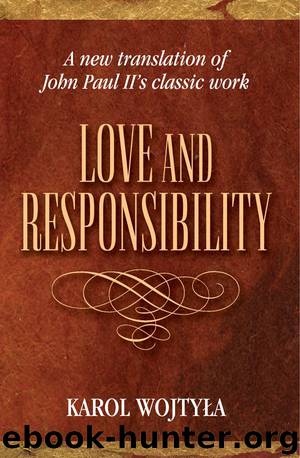Love and Responsibility by Woktyla Karol & Ignatik Grzegorz

Author:Woktyla, Karol & Ignatik, Grzegorz [Woktyla, Karol]
Language: eng
Format: epub
Publisher: Pauline Books and Media
Published: 2013-03-19T00:00:00+00:00
The value of the institution
The above reflections prepared us to understand the value of the institution of marriage. For marriage cannot be understood merely as the very fact of sexual intercourse of some human couple, a man and a woman, but we must see in marriage an institution. However, whereas it is beyond doubt that the fact of bodily intercourse between given persons, Y and X, really determines the institution (hence the old Latin adage: matrimonium facit copula), intercourse itself outside the frame-work of institution is not yet marriage.8 The word “institution” means the same as “establishment” or “organization” that results from the order of justice. As it is known, the order of justice concerns inter-personal matters and social matters (commutative justice, social justice). Now, marriage is an inter-personal and a social matter.
The very fact of sexual intercourse between two individual persons, a man and a woman, possesses an intimate character due to reasons already described in the previous chapter (in the analysis of shame). Nevertheless, both persons taking part in it belong to society, and for many reasons they should justify their intercourse with respect to society. Precisely the institution of marriage constitutes this justification. The point here is not merely justification in the sense of legalization, in the sense of conforming to the law. To “justify” means to “make just.” It also has nothing in common with making excuses, with providing extenuating circumstances in an attempt to vindicate a consent to something that is in fact evil.9
The need to justify intercourse between a man and a woman with respect to society occurs not only because of the ordinary consequences of this intercourse, but also due to the very persons partaking in it, and particularly the woman. The ordinary consequence of sexual intercourse between a man and a woman is progeny. A child is a new member of society—and society must accept him, and even register him (presuming an adequately high organization of society). The birth of a child causes the union of a man and a woman based on sexual intercourse to become a family. The family itself is already a community, a small society, on which the existence of every large society depends, e.g., a nation, a state, the Church. It is understandable that this large society tries to watch over the process of its continuous becoming through the family. The family is the most elementary institution connected with the foundations of human existence.* It inheres in a large society, which it constantly creates, but at the same time it is distanced from that society; it possesses its own character and ends. Both, i.e., the immanence of the family in society as well as its specific autonomy and inviolability, must be reflected in legislation. The starting point here is the law of nature—the objectivization of the order that follows from the very nature of the family.
The family is an institution that has marriage at its foundation. It is impossible to order the family correctly within the life of a large society without correctly ordering marriage.
Download
This site does not store any files on its server. We only index and link to content provided by other sites. Please contact the content providers to delete copyright contents if any and email us, we'll remove relevant links or contents immediately.
The Hatha Yoga Pradipika (Translated) by Svatmarama(2476)
Real Sex by Lauren F. Winner(2466)
The Holy Spirit by Billy Graham(2408)
The Secret Power of Speaking God's Word by Joyce Meyer(2248)
The Gnostic Gospels by Pagels Elaine(2023)
Devil, The by Almond Philip C(1896)
23:27 by H. L. Roberts(1889)
Jesus by Paul Johnson(1882)
The Nativity by Geza Vermes(1845)
All Things New by John Eldredge(1779)
Chosen by God by R. C. Sproul(1754)
Angels of God: The Bible, the Church and the Heavenly Hosts by Mike Aquilina(1625)
The Return of the Gods by Erich von Daniken(1569)
Angels by Billy Graham(1546)
Evidence of the Afterlife by Jeffrey Long(1457)
Knowing God by J.I. Packer(1429)
The Gnostic Gospel of St. Thomas by Tau Malachi(1406)
Victorian Sensation by James A. Secord(1403)
How To Be Born Again by Billy Graham(1402)
